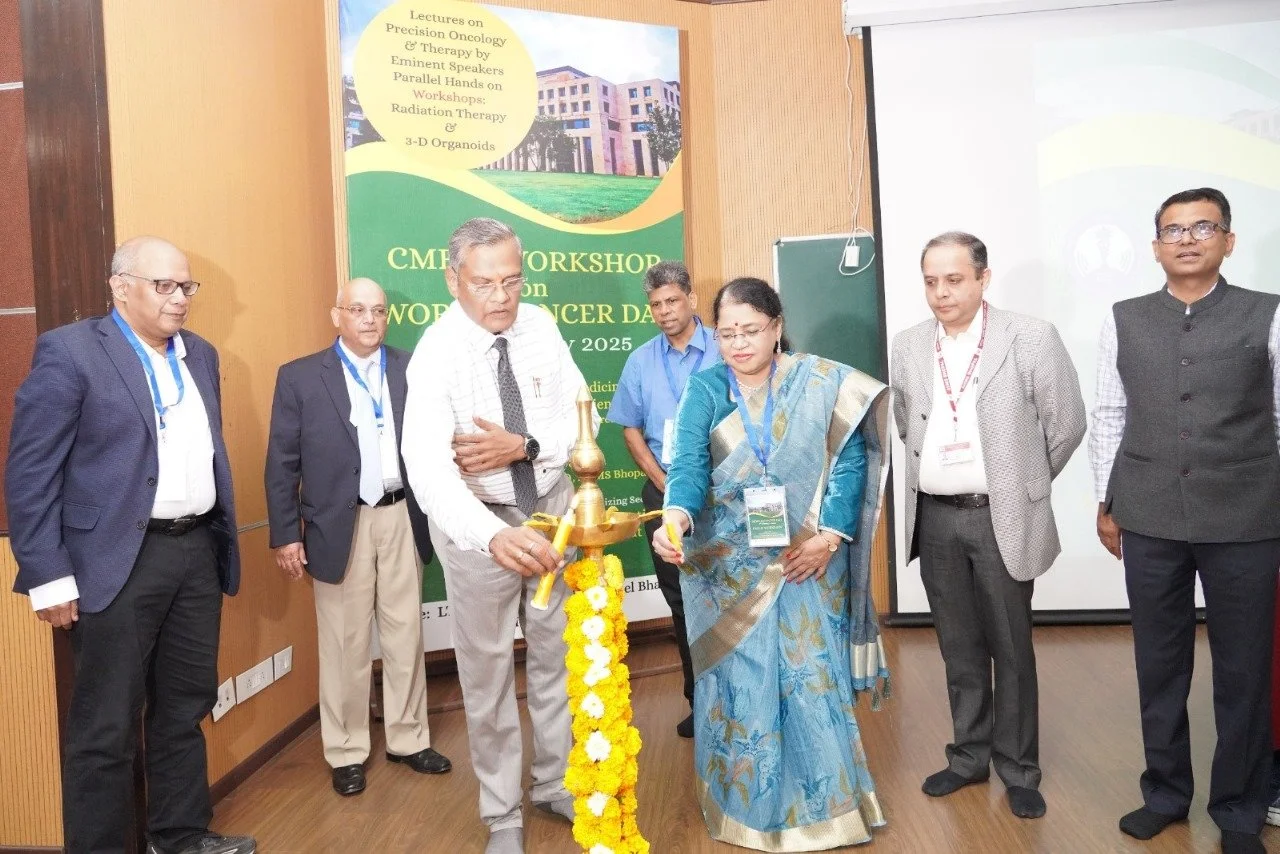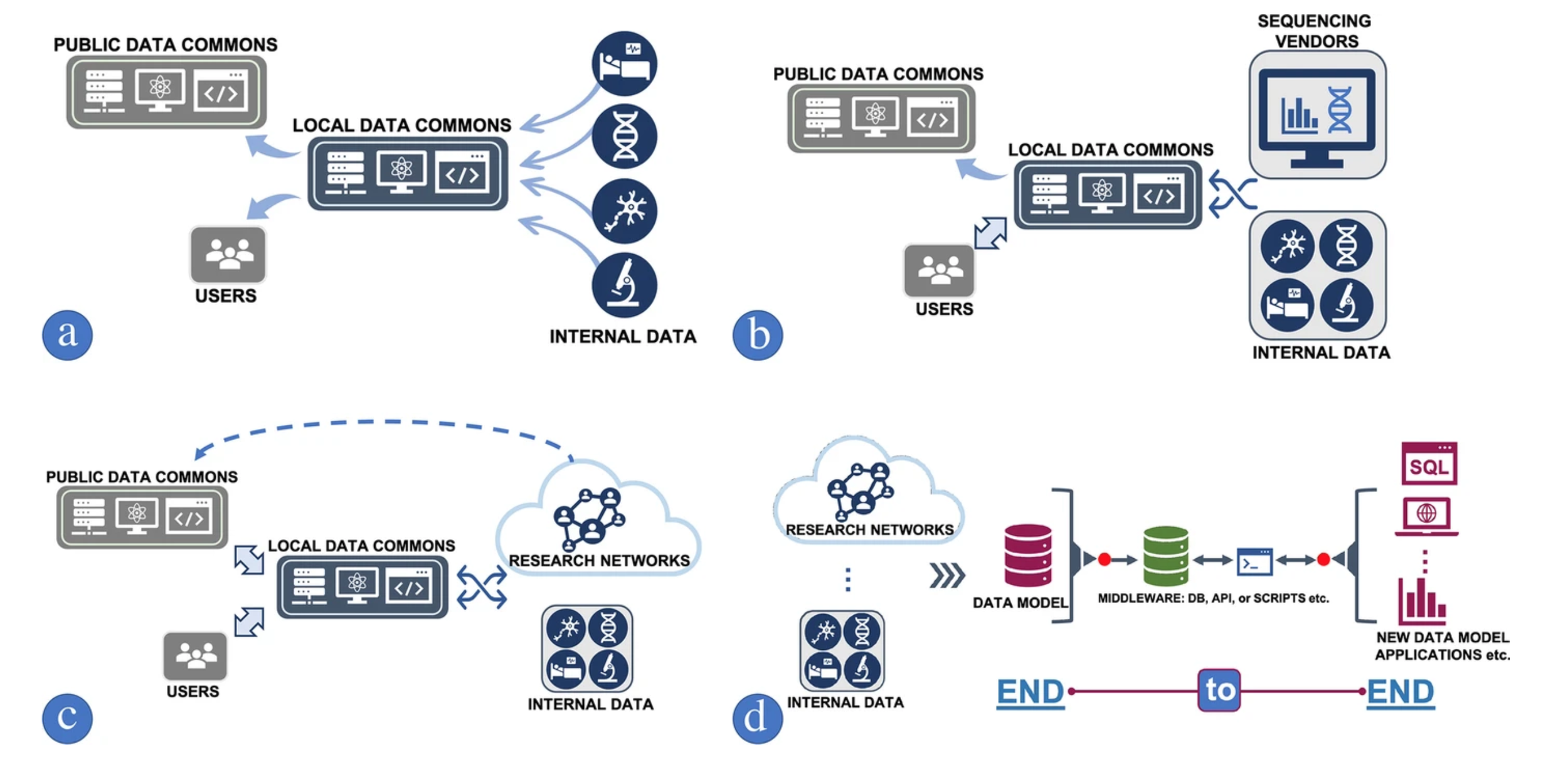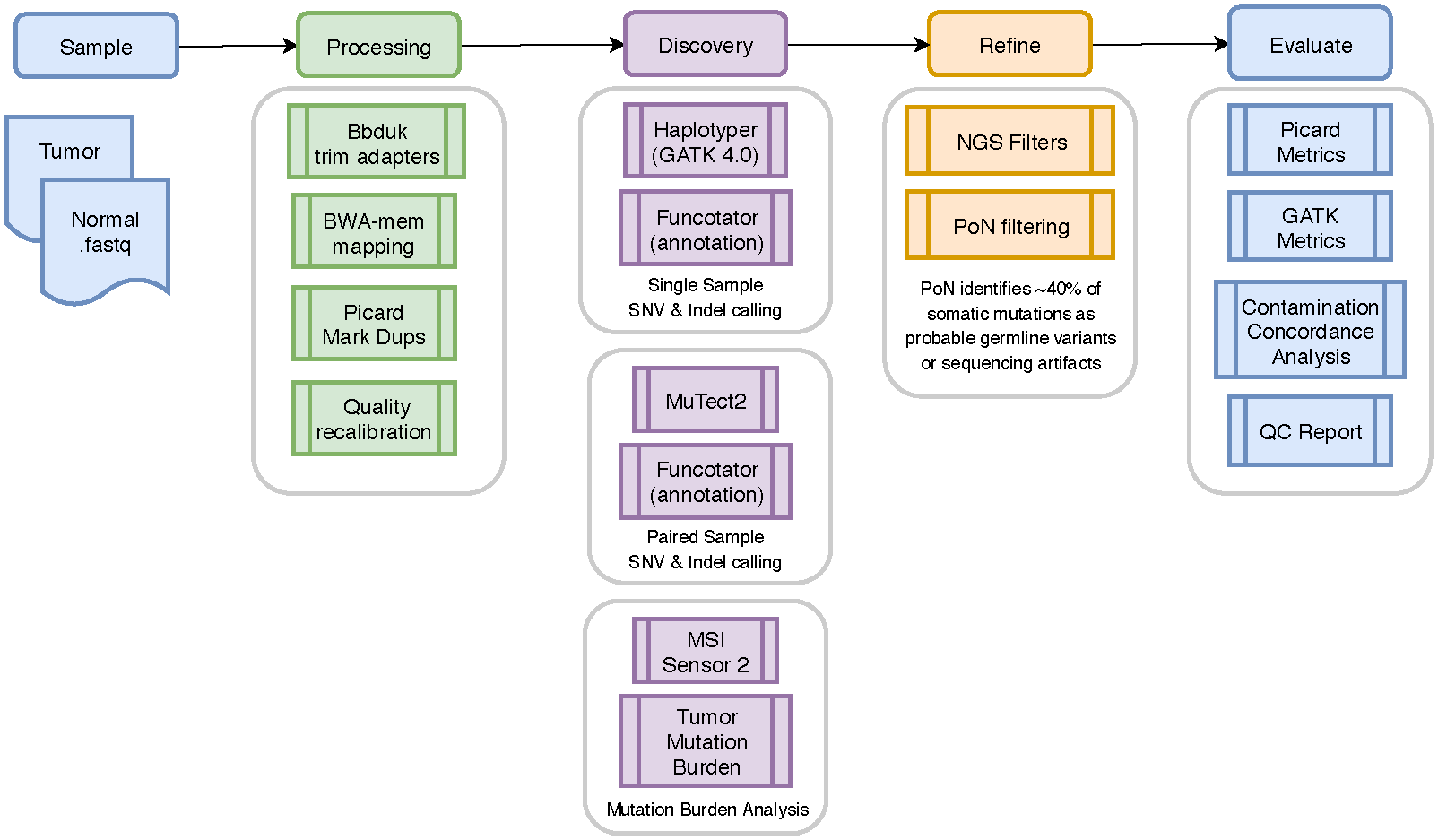FEATURED ARTICLE
Markey Forges Global
Alliance for Cancer Research
In The News
-

World Cancer Day
AIIMS Bhopal to Promote Precision Oncology & International Collaboration
-

Markey Study
New Target Potential Therapy For Treatment-Resistant Cancers
-

UK HealthCare
Markey Forges Global Alliance
For Cancer Research -

Utilizing Pan-Omics Technologies
and 3D in Vitro Tumor Models for Drug Discovery and Precision Medicine
-

Manipal School of Life Sciences
inaugurates Global Cancer Consortium Interdisciplinary Lab
-

Existing Drug Shows Promise
treating most prevalent type of non-small cell lung cancer
-

2nd International Conference of Global Cancer Consortium at Manipal
Conducted jointly by Kasturba Medical College Manipal, Global cancer consortium and Manipal Comprehensive Cancer Care Centre
-

Second International Conference of GCC held in Manipal
Our projects are based on the philosophy that globalization is impactful because it broadens our perspective.
-

Markey GCC Studies New Option for Diagnosing Lung Cancer
There is evidence that liquid biopsies have the potential to replace tumor biopsies that require patients to undergo…
-

UK leads Inter-Continental Cancer Consortium
to strengthen global cancer research leadership in collaboration with Manipal Academy of Higher Education
-

International Cancer Consortium to Strengthen Global Cancer Research Leadership
The Indo-American Cancer Consortium (IACC) is the first collaborative initiative involving multiple tertiary …
-

Intl Cancer Consortium to Strengthen Global Cancer Research Leadership
in collaboration with Manipal Academy of Higher Education. The consortium is expected to generate infrastructure…
-

MAHE Now a Participating Institute of Indo-US Cancer Consortium
The consortium offers online courses in basic cancer biology, translational oncology, and epidemiology
-

International Cancer Consortium to Strengthen Global Cancer Research
The initiative will create a global transdisciplinary team basic cancer researchers, oncologists, epidemiologists, …
-

Advancing Cancer Care Through Global Cooperation
The UK Markey Cancer Center continues to expand its national and international research partnerships …
Peer-reviewed Publications
S6K1 is a Targetable Vulnerability in Tumors Exhibiting Plasticity and Therapy Resistance
Background: Most tumors initially respond to treatment, yet refractory clones subsequently develop owing to resistance mechanisms associated with cancer cell plasticity and heterogeneity.
by Saptadwipa Ganguly, Ravshan Burikhanov, Vitaliy M. Sviripa, Sally Ellingson, Jieyun Jiang, Christian M. Gosser, David Orren, Eva M. Goellner, Gautham G. Shenoy, Mahadev Rao, John D’Orazio, Christine F. Brainson, Chang-Guo Zhan, Peter H. Spielmann, David S. Watt, and Vivek M. Rangnekar.
Int J Biol Sci 2025; 21(2):454-472
Impact Factor: 8.2
Prognostic Indicators for Precision Treatment of Non-Small Cell Lung Carcinoma
Non-small cell lung cancer (NSCLC) has established predictive biomarkers that enable decisions on treatment regimens for many patients. However, resistance to therapy is widespread. It is therefore essential to have a panel of molecular biomarkers that may help overcome therapy resistance and prevent adverse effects of treatment.
by Damayanti Das Ghosh ,Hannah McDonald, Rajeswari Dutta, Keerthana Krishnan, Jaya Thilakan, Manash K. Paul, Neha Arya, Mahadev Rao, and Vivek M. Rangnekar
Cells 2024, 3(21), 1785
Impact Factor: 5.1
Molecular Susceptibility and Treatment Challenges in Melanoma
Melanoma is the most aggressive subtype of cancer, with a higher propensity to spread compared to most solid tumors. The application of OMICS approaches has revolutionized the field of melanoma research by providing comprehensive insights into the molecular alterations and biological processes underlying melanoma development and progression.
by Kiran Kumar Kolathur, Radhakanta Nag, Prathvi V Shenoy, Yagya Malik, Sai Manasa Varanasi, Ramcharan Singh Angom, Debabrata Mukhopadhyay
Cells 2024, 13(16), 1383
Impact Factor: 5.1
KRAS Mutation Subtypes and Their Association with Other Driver Mutations in Oncogenic Pathways
The KRAS mutation stands out as one of the most influential oncogenic mutations, which directly regulates the hallmark features of cancer and interacts with other cancer-causing driver mutations. However, there remains a lack of precise information on their cooccurrence with mutated variants of KRAS and any correlations between KRAS and other driver mutations. To enquire about this issue, we delved into cBioPortal, TCGA, UALCAN, and Uniport studies.
by Koushik Mondal, Mahesh Kumar Posa, Revathi P. Shenoy and Susanta Roychoudhury
Cells 2024, 13(14), 1221
Impact Factor: 5.1
Integration of Pan-omics Technologies and Three-dimensional In Vitro Tumor Models:
An Approach Toward Drug Discovery and Precision Medicine – Molecular Cancer
Despite advancements in treatment protocols, cancer is one of the leading cause of deaths worldwide. Therefore, there is a need to identify newer and personalized therapeutic targets along with screening technologies to combat cancer. With the advent of pan-omics technologies, such as genomics, transcriptomics, proteomics, metabolomics, and lipidomics, the scientific community has witnessed an improved molecular and metabolomic understanding of various diseases, including cancer.
Predictive Performance of Population Pharmacokinetic Models of Imatinib
in Chronic Myeloid Leukemia Patients – Cancer Chemotherapy and Pharmacology
Background and aim Chronic myeloid leukemia is a myeloproliferative neoplasm associated with the specific chromosomal translocation known as the Philadelphia chromosome. Imatinib is a potent BCR-ABL tyrosine kinase inhibitor, which is approved as the first line therapy for CML patients. There are various population pharmacokinetic studies available in the literature for this population.
by Jaya Shree Dilli Batcha, Vikram Gota, Saikumar Matcha, Arun Prasath Raju, Mahadev Rao, Karthik S. Udupa, Surulivelrajan Mallayasamy
Cancer Chemother Pharmacol 2024 Mar 5
Impact Factor: 2.7
Increased Gene Expression of C1orf74 Is Associated with Poor Prognosis in Cervical Cancer
C1orf74, also known as URCL4, has been reported to have higher expression and be associated with poor prognosis in lung adenocarcinoma patients, and its role in regulation of the EGFR/AKT/mTORC1 pathway has been recently elucidated. In the current study, we used publicly available data and experimental validation of C1orf74 gene expression and its association with prognosis in cervical cancer patients. qRT-PCR was performed using RNA from cervical cancer cell lines and twenty-five cervical cancer patients.
by Preetiparna Parida, Shirley Lewis, Krishna Sharan, Mehta Vedant Kamal, Naveena A. N. Kumar, Vishwapriya M. Godkhindi, Sooryanarayana Varambally, Vivek M. Rangnekar, Mahadev Rao, and Rama Rao Damerla
Cells 2023, 12(21), 2530.
Impact Factor: 6.0
Insights from a Computational-Based Approach for Analyzing Autophagy Genes across Human Cancers
In the last decade, there has been a boost in autophagy reports due to its role in cancer progression and its association with tumor resistance to treatment. Despite this, many questions remain to be elucidated and explored among the different tumors. Here, we used omics-based cancer datasets to identify autophagy genes as prognostic markers in cancer.
by Alexis Germán Murillo Carrasco, Guilherme Giovanini, Alexandre Ferreira Ramos, Roger Chammas and Silvina Odete Bustos
Genes 2023, 14(8), 1550
Impact Factor: 2.8
Crizotinib Induces Par-4 Secretion From Normal Cells and GRP78 Expression on
the Cancer Cell Surface for Selective Tumor Growth Inhibition
Lung cancer is the leading cause of cancer-related deaths. Lung cancer cells develop resistance to apoptosis by suppressing the secretion of the tumor suppressor Par-4 protein (also known as PAWR) and/or down-modulating the Par-4 receptor GRP78 on the cell surface (csGRP78). We sought to identify FDA-approved drugs that elevate csGRP78 on the surface of lung cancer cells and induce Par-4 secretion from the cancer cells and/or normal cells in order to inhibit cancer growth in an autocrine or paracrine manner.
by Ravshan Burikhanov, Saptadwipa Ganguly, Sally Ellingson, Vitaliy M Sviripa, Nathalia Araujo, Shunqiang Li, Prasanna Venkatraman, Mahadev Rao, Anuradha Choughule, Christine F Brainson, Chang-Guo Zhan, H Peter Spielmann, David S Watt, Ramaswamy Govindan, Vivek M Rangnekar
American Journal of Cancer Research 2023;13(3):976-991.
Impact Factor: 5.942
Factors Influencing Pharmacokinetics of Tamoxifen in Breast Cancer Patients:
A Systematic Review of Population Pharmacokinetic Models
Background: Tamoxifen is useful in managing breast cancer and it is reported to have significant variability in its pharmacokinetics. This review aimed to summarize reported population pharmacokinetics studies of tamoxifen and to identify the factors affecting the pharmacokinetics of tamoxifen in ad…
by Jaya Shree Dilli Batcha, Arun Prasath Raju, Saikumar Matcha, Elstin Anbu Raj S., Karthik S. Udupa, Vikram Gota and Surulivelrajan Mallayasamy
Biology 2023, 12(1), 51
Impact Factor: 5.168
Local Data Commons: The Sleeping Beauty in the Community of Data Commons
– BMC Bioinformatics
Public Data Commons (PDC) have been highlighted in the scientific literature for their capacity to collect and harmonize big data. On the other hand, local data commons (LDC), located within an institution or organization, have been underrepresented in the scientific literature, even though they are a critical part of research infrastructure. Being closest to the sources of data, LDCs provide the ability to collect and maintain the most up-to-date, high-quality data within an organization, closest to the sources of the data.
by Jong Cheol Jeong, Isaac Hands, Jill M. Kolesar, Mahadev Rao, Bront Davis, York Dobyns, Joseph Hurt-Mueller, Justin Levens, Jenny Gregory, John Williams, Lisa Witt, Eun Mi Kim, Carlee Burton, Amir A. Elbiheary, Mingguang Chang & Eric B. Durbin
BMC Bioinformatics volume 23, Article number: 386 (2022)
Impact Factor: 3.169
Integration of liquid biopsy and pharmacogenomics for precision therapy
of EGFR mutant and resistant lung cancers – PubMed
The advent of molecular profiling has revolutionized the treatment of lung cancer by comprehensively delineating the genomic landscape of the epidermal growth factor receptor (EGFR) gene. Drug resistance caused by EGFR mutations and genetic polymorphisms of drug metabolizing enzymes and transporters impedes effective treatment of EGFR mutant and resistant lung cancer.
by Kolesar J, Peh S, Thomas L, Baburaj G, Mukherjee N, Kantamneni R, Lewis S, Pai A, Udupa KS, Kumar An N, Rangnekar VM, Rao M.
Mol Cancer. 2022 Feb 24;21(1):61.
Impact Factor: 25
Raman Micro-spectroscopic Map Estimating in Vivo Precision of Tumor
Ablative Effect Achieved by Photothermal Therapy Procedure – PubMed
Photothermal-therapy (PTT) inculcates near-infrared laser guided local heating effect, where high degree of precision is expected, but not well proven to-date. An ex vivo tissue biochemical map with molecular/biochemical response showing the coverage area out of an optimized PTT procedure can reveal precision information. In this work, Raman-microscopic mapping and linear discriminant analysis of spectra of PTT treated and surrounding tissue areas ex vivo are done, revealing three distinct spectral clusters/zones, with minimal overlap between the core treated and adjacent untreated zone.
by Sumit K.Mishra, Arti Hole, B. Pradeep K.Reddy, Rohit Srivastava, Murali Krishna Chilakapati, Abhijit De. Nanomedicine 2021 Oct;37:102437.
Impact Factor: 6.5
Therapeutic Opportunities in Cancer Therapy: Targeting the p53-MDM2/MDMX Interactions
– PubMed
Ubiquitination is a key enzymatic post-translational modification that influences p53 stability and function. p53 protein regulates the expression of MDM2 (mouse double-minute 2 protein) E3 ligase and MDMX (double-minute 4 protein), through proteasome-based degradation. Exploration of targeting the ubiquitination pathway offers a potentially promising strategy for precision therapy in a variety of cancers.
by Munisamy M, Mukherjee N, Thomas L, Pham AT, Shakeri A, Zhao Y, Kolesar J, Rao PPN, Rangnekar VM, Rao M.
Am J Cancer Res. 2021 Dec 15;11(12).
Impact Factor: 6.166
Value Added by an Inter-Continental Cancer Consortium – PubMed
The United States of America reports almost double the number of cancer cases relative to India that has a much larger overall population. Accurate insights into such differences in cancer rates may be provided by a better understanding of the genetic and lifestyle influences on tumor growth, progression, heterogeneity, and the underlying stressors that prompt pre-clinical dormant lesions to progress into malignant tumors, as well as by synchronizing the cancer surveillance protocols in the two countries. Toward this goal, an Indo-American Cancer Consortium was conceived.
by Rao M, Venkatraman P, Mukhopadhyay D, Roychoudhury S, Vanderford NL, Rangnekar VM.
Genes Cancer. 2021 May 21;12:65-68.
Impact Factor: 5.666
DACH1 Mutation Frequency in Endometrial Cancer is Associated with
High Tumor Mutation Burden – PubMed
DACH1 is a transcriptional repressor and tumor suppressor gene frequently mutated in melanoma, bladder, and prostate cancer. Loss of DACH1 expression is associated with poor prognostic features and reduced overall survival in uterine cancer. In this study, we utilized the Oncology Research Information Exchange Network (ORIEN) Avatar database to determine the frequency of DACH1 mutations in patients with endometrial cancer in our Kentucky population.
by Riggs MJ, Lin N, Wang C, Piecoro DW, Miller RW, Hampton OA, Rao M, Ueland FR, Kolesar JM.
PLoS One. 2020 Dec 30;15(12).
Impact Factor: 3.240
Liquid Biopsy Approaches for Pleural Effusion in Lung Cancer Patients – PubMed
Genomic profiling of tumors has become the mainstay for diagnosis, treatment monitoring and a guide to precision medicine. However, in clinical practice, the detection of driver mutations in tumors has several procedural limitations owing to progressive disease and tumor heterogeneity. The current era of liquid biopsy promises a better solution. This diagnostic utility of liquid biopsy has been demonstrated by numerous studies for the detection of cell-free DNA (cfDNA) in plasma for disease diagnosis, prognosis, and prediction.
by Baburaj G, Damerla RR, Udupa KS, Parida P, Munisamy M, Kolesar J, Rao M.
Mol Biol Rep. 2020 Oct;47(10)
Impact Factor: 2.316
Histone Demethylase KDM5B as a Therapeutic Target for Cancer Therapy – PubMed
Lysine-specific demethylase 5B (KDM5B/PLU1/JARID1B) is found to be overexpressed in numerous malignancies, including breast, lung, skin, liver, and prostate cancer. Identification of molecules targeting the KDM5B enzyme could be a potential lead in cancer research. Although many KDM5B inhibitors with promising outcomes have been developed so far, its further application in clinical practice is limited due to toxicity and lack of target specificity.
by Jose A, Shenoy GG, Sunil Rodrigues G, Kumar NAN, Munisamy M, Thomas L, Kolesar J, Rai G, Rao PPN, Rao M.
Cancers (Basel). 2020 Jul 31;12(8):2121.
Impact Factor: 6.639
Select Grants
COMMUNITY OUTREACH GRANT
Members of the Global Cancer Consortium are actively involved in supporting community outreach projects. Consortium founding member Dr. Susanta Roychoudhury in partnership with Dr. Ramdas Chatterjee, President, Krishna Kumar Chatterjee Memorial Association, a registered Non-Government Organisation (NGO), is conducting a Cervical Cancer Awareness and Screening Program in Kolkata, West Bengal.
PRECISION MEDICINE GRANT FROM THE GOVERNMENT OF INDIA
High-End Workshop on “Clinical and Translational Research for Precision Medicine” sponsored by Department of Science & Technology (DST) Consortium founding member Dr. Mahadev Rao, Manipal Academy of Higher Education (MAHE), has received workshop grant from Department of Science & Technology (DST), Science & Engineering Research Board (SERB) under the Accelerate Vigyan Scheme ‘KARYASHALA’, Government of India, New Delhi, INDIA.
PRECISION ONCOLOGY GRANT FROM THE GOVERNMENT OF INDIA
Workshop on “Clinical and Translational Research for Precision Oncology” sponsored by Indian Council of Medical Research (ICMR)
The Global Cancer Consortium (GCC) founding member Dr. Mahadev Rao, Manipal College of Pharmaceutical Sciences, GCC consortium faculty Dr. Karthik Udupa and Dr Rama Rao Damerla, Kasturba Medical College, and Dr. Shama Prasada K, Manipal School of Life Sciences, Manipal Academy of Higher Education (MAHE), have received a Workshop grant from ICMR, Government of India, New Delhi, INDIA. The Workshop is organised for selected 30 participants across India from March 29 – April 01, 2023, in the Department of Medical Education at MAHE.
-
Precision oncology is an emerging approach to cancer treatment and prevention that considers individual variability in genes, environment, and lifestyle to develop an individualized treatment plan. The current thrust in medical research is translational research. Translational research is a two-way process to translate discoveries into clinical application and the translation of clinical findings into the understanding of molecular mechanisms. The workshop intends to provide an overview of translational science through multidisciplinary and multi-institutional integrated learning mechanisms with an objective of equipping the researchers to integrate information from multiple domains and conduct independent and team-oriented research that is scientifically sound, ethical, culturally adaptive and contributes to improve human and global health.
With the help of scientific expertise of national and international institutions from Global Cancer Consortium the workshop is expected to facilitate new ideas to be investigated in an expeditious manner and equip the researchers from both clinical and basic science backgrounds to pursue new clinical or laboratory approaches. Importantly, novel topics and avenues will be created for productive research. The workshop is expected to contribute to the current trends in translational research fields, including precision oncology, omics, cardio-oncology, chromosomal instabilities in human cancer, immuno-oncology, and translational oncology. The workshop provides hands-on training in cfDNA extraction, from lung cancer blood samples, DNA and RNA isolation and real time PCR: oncogene expression in breast cancers, next generation sequencing demonstration, and cBioportal and UALCAN demonstration: how to browse or extract data from tumor portals and Phoenix WinNonlin software for pharmacometrics in precision oncology. This should lead to significant scientific advances in research and facilitate translation to improve patient outcomes in clinical practice and promote the professional development of researchers to become future leaders in multi-disciplinary team-oriented, translational scientific research.




















